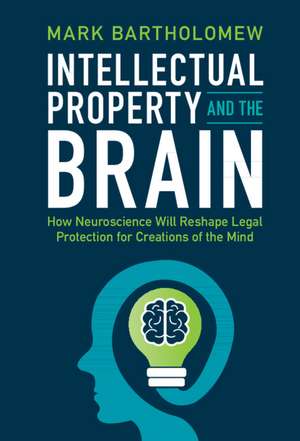Intellectual Property and the Brain: How Neuroscience Will Reshape Legal Protection for Creations of the Mind
Autor Mark Bartholomewen Limba Engleză Paperback – 27 iul 2022
| Toate formatele și edițiile | Preț | Express |
|---|---|---|
| Paperback (1) | 262.73 lei 6-8 săpt. | |
| Cambridge University Press – 27 iul 2022 | 262.73 lei 6-8 săpt. | |
| Hardback (1) | 691.32 lei 6-8 săpt. | |
| Cambridge University Press – 27 iul 2022 | 691.32 lei 6-8 săpt. |
Preț: 262.73 lei
Nou
Puncte Express: 394
Preț estimativ în valută:
50.28€ • 51.94$ • 41.82£
50.28€ • 51.94$ • 41.82£
Carte tipărită la comandă
Livrare economică 19 martie-02 aprilie
Preluare comenzi: 021 569.72.76
Specificații
ISBN-13: 9781009189552
ISBN-10: 1009189557
Pagini: 220
Ilustrații: Worked examples or Exercises
Dimensiuni: 150 x 229 x 10 mm
Greutate: 0.28 kg
Ediția:Nouă
Editura: Cambridge University Press
Colecția Cambridge University Press
Locul publicării:New York, United States
ISBN-10: 1009189557
Pagini: 220
Ilustrații: Worked examples or Exercises
Dimensiuni: 150 x 229 x 10 mm
Greutate: 0.28 kg
Ediția:Nouă
Editura: Cambridge University Press
Colecția Cambridge University Press
Locul publicării:New York, United States
Cuprins
Part I. The law and neuroscience of creative activity: 1. Copyright and creativity; 2. Inside the design process; Part II. Understanding audiences for art and advertising; 3. Neuroaesthetics and copyright infringement; 4. Seeing design; 5. Neuromarks; Part III. Using neuroscience to improve intellectual property law; 6. How to take creativity seriously; 7. Know your audience; 8. Advertising, fast and slow; Conclusion.
Recenzii
'In this engaging and pathbreaking book, Professor Mark Bartholomew uncovers how neuroscience is poised to dramatically change intellectual property theory and practice. This innovative book is the first to explore the promise and peril of neuroscience for patent and copyright law. It's a must read for lawyers, students, scholars, and anyone who has ever wondered about how the law protects our unique human creativity.' Francis Shen, Associate Professor of Psychiatry, MGH & Harvard Medical School Center for Bioethics, Affiliated Professor, Harvard Law School
'It would seem self-evident that discussions about intellectual property would consider properties of the intellect. Yet, our legal system seems reluctant to take seriously the vehicle of intellect-the human brain-in its deliberations. How should judges decide what makes products of the mind similar? By masterfully delving into the neuroscience of creativity, aesthetics, and decision-making as they apply to copyright, patent, and trademark law, Mark Bartholomew diagnoses the disarray of current legal practices and identifies how modern science might point to ways out of the confusion. This book is vitally important for legal scholars and practitioners preoccupied with protecting creations of the mind, for neuroscientists who care about real world implications of their research, and for anyone who wonders how the law shapes the economics of human creativity.' Anjan Chatterjee, Professor of Neurology, Psychology, and Architecture, Director, Penn Center for Neuroaesthetics, University of Pennsylvania
'Professor Bartholomew artfully and cogently melds a century of confusing intellectual property doctrine with decades of innovative insights from neuroscience to help us rethink how courts have approached copyright, design patent, and trademark cases. Readers also get a fresh perspective on law and psychology and that field's take on cognition and emotion, as applied to art, design, and advertising. Law is not rocket science or brain surgery, but this important book teaches that the future of intellectual property law may lie in brain science.' Shubha Ghosh, Crandall Melvin Professor of Law and Director, IP Commercialization and Innovation Law Curricular Program, Syracuse Intellectual Property Law Institute
'By appreciating the challenges and possibilities emerging neuroscientific insights might present for the intellectual property law, this provocative book - a sophisticated thought experiment - will encourage reconsideration of our understanding of 'creativity' and aesthetics and ultimately compel reevaluation of law's objects in this important field.' Peter A. Alces, Rollins Professor of Law, William & Mary Law School, author of The Moral Conflict of Law and Neuroscience
'It would seem self-evident that discussions about intellectual property would consider properties of the intellect. Yet, our legal system seems reluctant to take seriously the vehicle of intellect-the human brain-in its deliberations. How should judges decide what makes products of the mind similar? By masterfully delving into the neuroscience of creativity, aesthetics, and decision-making as they apply to copyright, patent, and trademark law, Mark Bartholomew diagnoses the disarray of current legal practices and identifies how modern science might point to ways out of the confusion. This book is vitally important for legal scholars and practitioners preoccupied with protecting creations of the mind, for neuroscientists who care about real world implications of their research, and for anyone who wonders how the law shapes the economics of human creativity.' Anjan Chatterjee, Professor of Neurology, Psychology, and Architecture, Director, Penn Center for Neuroaesthetics, University of Pennsylvania
'Professor Bartholomew artfully and cogently melds a century of confusing intellectual property doctrine with decades of innovative insights from neuroscience to help us rethink how courts have approached copyright, design patent, and trademark cases. Readers also get a fresh perspective on law and psychology and that field's take on cognition and emotion, as applied to art, design, and advertising. Law is not rocket science or brain surgery, but this important book teaches that the future of intellectual property law may lie in brain science.' Shubha Ghosh, Crandall Melvin Professor of Law and Director, IP Commercialization and Innovation Law Curricular Program, Syracuse Intellectual Property Law Institute
'By appreciating the challenges and possibilities emerging neuroscientific insights might present for the intellectual property law, this provocative book - a sophisticated thought experiment - will encourage reconsideration of our understanding of 'creativity' and aesthetics and ultimately compel reevaluation of law's objects in this important field.' Peter A. Alces, Rollins Professor of Law, William & Mary Law School, author of The Moral Conflict of Law and Neuroscience
Notă biografică
Descriere
This book describes the promise and pitfalls of using neuroscience to better understand creators and the audiences for their creations.
